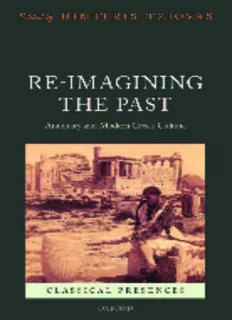
Re-imagining the past: antiquity and modern Greek culture PDF
Preview Re-imagining the past: antiquity and modern Greek culture
CLASSICAL PRESENCES GeneralEditors LornaHardwick JamesI.Porter CLASSICAL PRESENCES Attemptstoreceivethetexts,images,andmaterialcultureofancient Greece and Rome inevitably run the risk of appropriating the past in order to authenticate the present. Exploring the ways in which the classical past has been mapped over the centuries allows us to trace the avowal and disavowal of values and identities, old and new. Classical Presences brings the latest scholarship to bear on the contexts, theory, and practice of such use, and abuse, of the classical past. Re-imagining the Past Antiquity and Modern Greek Culture Edited by DIMITRIS TZIOVAS 1 3 GreatClarendonStreet,Oxford,OX26DP, UnitedKingdom OxfordUniversityPressisadepartmentoftheUniversityofOxford. ItfurtherstheUniversity’sobjectiveofexcellenceinresearch,scholarship, andeducationbypublishingworldwide.Oxfordisaregisteredtrademarkof OxfordUniversityPressintheUKandincertainothercountries #OxfordUniversityPress2014 Themoralrightsoftheauthorshavebeenasserted FirstEditionpublishedin2014 Impression:1 Allrightsreserved.Nopartofthispublicationmaybereproduced,storedin aretrievalsystem,ortransmitted,inanyformorbyanymeans,withoutthe priorpermissioninwritingofOxfordUniversityPress,orasexpresslypermitted bylaw,bylicenceorundertermsagreedwiththeappropriatereprographics rightsorganization.Enquiriesconcerningreproductionoutsidethescopeofthe aboveshouldbesenttotheRightsDepartment,OxfordUniversityPress,atthe addressabove Youmustnotcirculatethisworkinanyotherform andyoumustimposethissameconditiononanyacquirer PublishedintheUnitedStatesofAmericabyOxfordUniversityPress 198MadisonAvenue,NewYork,NY10016,UnitedStatesofAmerica BritishLibraryCataloguinginPublicationData Dataavailable LibraryofCongressControlNumber:2013953521 ISBN 978–0–19–967275–2 Printedandboundby CPIGroup(UK)Ltd,Croydon,CR04YY LinkstothirdpartywebsitesareprovidedbyOxfordingoodfaithand forinformationonly.Oxforddisclaimsanyresponsibilityforthematerials containedinanythirdpartywebsitereferencedinthiswork. Preface ThisbookhasitsoriginsinaconferenceIorganizedattheUniversity ofBirminghaminJune2011andrepresentsaselectionofthepapers presented there. The conference was a wide-ranging and exciting event, bringing together speakers from the UK, USA, Australia, Greece, Cyprus, the Netherlands, Belgium, Germany, Georgia, and Turkey. It was the first of its kind, and its scholarly importance is attestedbythefactthatmorethan120scholarsrespondedtothecall for papers and submitted abstracts for peer-review selection. Above all it was multidisciplinary, including contributions from historians, archaeologists, classicists, and specialists in art, drama, and literature. Iwouldliketothankallthespeakers,delegates,andsponsorsinvolved inthisevent,especiallytheJohnS.LatsisPublicBenefitFoundation,the Michael Marks Charitable Trust, the Hellenic Foundation in London, the Ouranis Foundation, the European Society of Modern Greek Studies, the Ministry of Culture of the Republic of Greece, and the MinistryofEducationandCultureoftheRepublicofCyprusfortheir generous support. I am also grateful to Dr Vassiliki Kolocotroni of Glasgow University for bringing to my attention the image used on thecover,andforprovidingmewithadigitalcopy. Thestudyofancient,medieval,andmodernGreeceunderoneroof hasbeenparticularlypopular attheUniversityof Birminghamsince the 1930s; it was fostered by scholars such as the classicist George Thomson (1903–87) and the linguist Nikolai Bakhtin (1894–1950), whobothtaughtClassicalandModernGreekthere.InJune1938the firstissueofthejournalTheLink,editedbyNikolaiBakhtin,beganits editorialby emphasizing the diachronic unity of Greek culture: ‘The mainobjectofTheLinkistointerpretthepastofGreecethroughits presentanditspresentthroughthepast,andthustorevealthebasic unityofGreekcivilizationinallitsmanifestationsandthroughoutits wholedevelopment.’AfewdecadeslaterGeorgeThomsonpublished his article on the continuity of Hellenism (Greece and Rome, 18(1), 1971,18–29),andProfessorMargaretAlexiou,atthattimealecturer in Byzantine and Modern Greek in Birmingham, explored the history of the lament from Homer to the present in her influential studyTheRitualLamentinGreekTradition(1974),whiletheroleof vi Preface theclassicaltraditionin Byzantiumwasthetheme oftheThirteenth SpringSymposiumofByzantineStudiesheldinBirminghamin1979. TheconferenceinJune2011andthepresentvolumecanbeseenasa continuationofthisfruitfulengagementwiththestudyoftherecep- tionofantiquityinByzantiumandModernGreece. DimitrisTziovas UniversityofBirmingham Contents Illustrations x NotesonContributors xii 1. Introduction:DecolonizingAntiquity,HeritagePolitics, andPerformingthePast 1 DimitrisTziovas PartI. Antiquity,Greece,andEurope 2. CollectingthePast:GreekAntiquariesandArchaeological KnowledgeintheVenetianEmpire 29 AnastasiaStouraiti 3. Re-imaginingGreekAntiquityin1821:Shelley’sHellasin itsLiteraryandPoliticalContext 47 RoderickBeaton 4. ASyncreticAntiquityinTranslation:PolisandPolitical ModernityinConflictinNineteenth-CenturyGreek Antigones 59 AlexandraLianeri PartII. Hellenisms,Institutions,andPolitics 5. AntiqueNamesandSelf-Identification:Hellenes,Graikoi, andRomaioifromLateByzantiumtotheGreekNation-State 81 TassosA.Kaplanis 6. TheChristianHellenismandLinguisticArchaismof NeofytosDoukas 98 PeterMackridge 7. TheUniversityofAthensandGreekAntiquity(1837–1937) 112 VangelisKaramanolakis 8. AntiquityasColdWarPropaganda:ThePoliticalUses oftheClassicalPastinPost-CivilWarGreece 128 AlexanderKazamias viii Contents PartIII. MaterialCultureandPerformancesofthePast 9. DeadArchaeologists,BuriedGods:Archaeologyasan AgentofModernityinGreece 147 DimitrisPlantzos 10. PossessingAntiquity:ReconnectingtothePastinthe GreekPresent 165 EleanaYalouri 11. PostcardsfromMetaxas’Greece:TheUsesofClassical AntiquityinTourismPhotography 186 KaterinaZacharia 12. BetweenTextsandContexts:ModernsagainstAncientsin theReceptionofAncientTragedyinGreece(1900–1933) 209 EleniPapazoglou PartIV. LiteraryReceptionsofAntiquity 13. SinandtheCity:AMid-Fifteenth-CenturyLamentfor theFallofAthenstothe‘Persians’ 229 GondaVanSteen 14. LucretianMomentsinModernGreekPoetry 252 DavidRicks 15. RethinkingtheGreekLegacy:DoriansinModernGreek Fiction 266 GunnarDeBoel 16. YannisRitsos,MarxistDialectics,andtheRe-imagining ofAncientGreece 282 MarinosPourgouris 17. TheWoundofHistory:RitsosandtheReceptionof Philoctetes 297 DimitrisTziovas 18. Plato,SeferisandHeaney:PoetryasRedress 318 RowenaFowler Contents ix PartV. GreekCultureandClassicalReception 19. ExceptionalitiesandParadigms:AncientandModern GreekCulturesinClassicalReceptionResearch 333 LornaHardwick References 350 Index 401
Description: